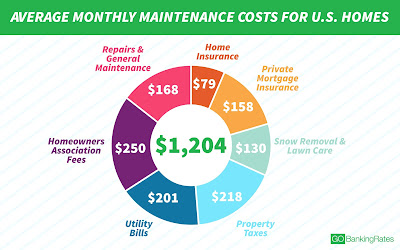The annual costs of owning and maintaining a home can be a big part of your monthly expense budget and overall housing costs.
When you've bought your dream house, admiring the new property's beauty and amenities is often a short experience, as you start thinking about how much the home cost and the money you need to spend on maintenance.
As a new homeowner, you can't forget about all the expenses that go into your property's upkeep and repair. Knowing exactly how much you have to spend on what can become a tricky business. Lucky for you, we've got you covered with a list of tips that you might find useful for budgeting your home maintenance.
1. Moving in
Lowering your expenditures should start after you've signed the contract on your new home. One of the things you need to spend money on is relocation. That's the reason why you need to find a moving company that not only does the move to perfection, but also offers its services at a great price.
Nowadays, it's not an impossible task to find the right movers. The services of experienced Manhattan movers don't cost a small fortune, and they are tailored to your needs. With the right tools and proper workforce, they'll make the move seem like a breeze.
2. The 1-4% range
As a general rule, you should expect to pay between 1% and 4% of your new house or apartment's value for maintenance on an annual basis. So, how much will you need to spend? If your home costs $350,000, you can expect to pay a minimum of $3,500 and a maximum of $14,000.
Of course, that's a wide range, but you should be prepared for an amount between them. Apart from this, you have to consider the age of your home and where it is situated. It's just logical that an older home needs more maintenance and also a bigger budget on your part. And you can't forget about its location. When you live in an area with extreme weather, both during summer and winter, the maintenance costs can rise.
3. Square footage counts
It's no surprise that the bigger your home is, the more you need to spend on maintenance. When it comes to making your budget for such things, it's a great idea to allocate at least $1 per square foot of your home for upkeep annually. If your house's or apartment's square footage is 3,000, then you'll probably spend around $3,000 on maintenance every year.
One of the negative aspects of this system is that it doesn't consider your home's location or age. So, if you plan on using the square footage system, you might find that you'd spent a bit more than expected.
4. Major repairs are not included in the maintenance budget
A big mistake new homeowners make is that they think significant repairs are a part of home maintenance. However, your budget should focus on those monthly or yearly repairs or upkeeping tasks that focus on general wear and tear problems. For example, your maintenance budget should focus on your lawn and grass, patio, or deck, making sure your vents and gutters are clean, replacing leaky faucets, and buying new filters on your air conditioning and heating unit.s
All of these are considered smaller repairs that you can pay from your maintenance budget. Focusing on significant repairs, such as replacing your water heater, costly appliances, air conditioning system, or your roof, you are going to spend a lot more than what you've allocated for the upkeep of your home. To tackle such major financial issues, it's a great idea to have a healthy savings account.

